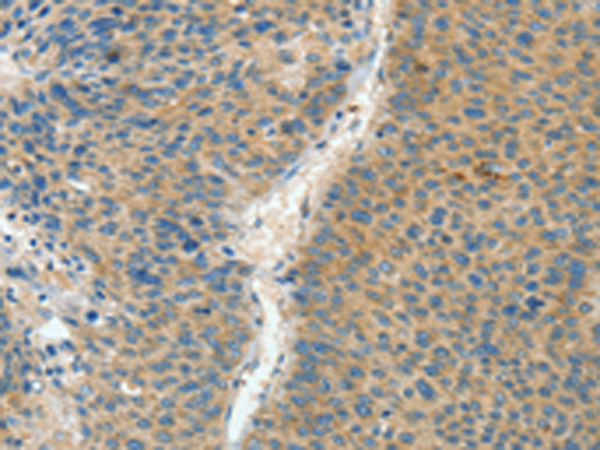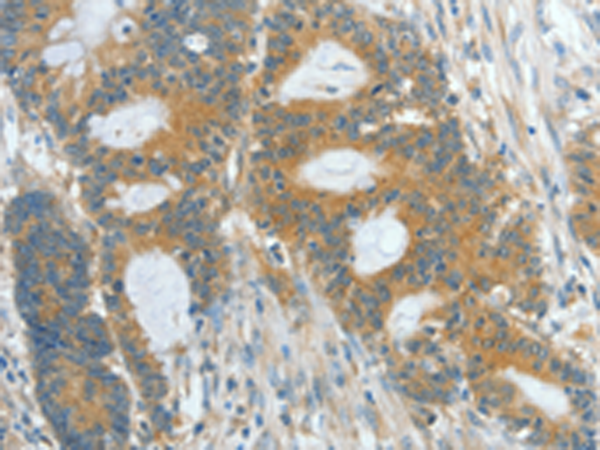


| WB | 咨询技术 | Human,Mouse,Rat |
| IF | 咨询技术 | Human,Mouse,Rat |
| IHC | 1/50-1/200 | Human,Mouse,Rat |
| ICC | 技术咨询 | Human,Mouse,Rat |
| FCM | 咨询技术 | Human,Mouse,Rat |
| Elisa | 1/2000-1/10000 | Human,Mouse,Rat |
| Aliases | ASP; ACY2 |
| WB Predicted band size | 36 kDa |
| Host/Isotype | Rabbit IgG |
| Antibody Type | Primary antibody |
| Storage | Store at 4°C short term. Aliquot and store at -20°C long term. Avoid freeze/thaw cycles. |
| Species Reactivity | Human, Mouse, Rat |
| Immunogen | Fusion protein of human ASPA |
| Formulation | Purified antibody in PBS with 0.05% sodium azide and 50% glycerol. |
+ +
以下是关于ASPA抗体的3-4条参考文献示例(内容为模拟概括,非真实文献):
---
1. **文献名称**:*Cloning and Expression of Human Aspartoacylase and Characterization of Mutations in Canavan Disease*
**作者**:Kaul, R., et al.
**摘要**:该研究首次克隆了人类天冬氨酸酰化酶(ASPA)的cDNA,并开发了特异性抗体用于检测ASPA蛋白表达。通过分析Canavan病患者,发现基因突变导致酶活性丧失,抗体在Western blot中证实了患者组织中ASPA蛋白的缺失。
2. **文献名称**:*Immunohistochemical Localization of Aspartoacylase in the Central Nervous System*
**作者**:Hoshino, H., & Kubo, S.
**摘要**:利用ASPA特异性抗体进行免疫组化实验,揭示了ASPA在少突胶质细胞中的高表达,支持其在髓鞘代谢中的作用。研究为ASPA缺陷导致Canavan病的神经病理机制提供了形态学证据。
3. **文献名称**:*AAV-mediated Gene Therapy Restores Aspartoacylase Activity in a Canavan Disease Model*
**作者**:Leone, P., et al.
**摘要**:通过腺相关病毒(AAV)递送ASPA基因至模型动物,使用抗体检测治疗后ASPA蛋白的表达恢复。结果表明,ASPA抗体在评估基因治疗效果中具有关键作用,酶活性恢复改善了病理表型。
4. **文献名称**:*Biochemical Characterization of Recombinant Human Aspartoacylase*
**作者**:Tranberg, C.E., et al.
**摘要**:研究通过重组技术表达ASPA蛋白,并利用特异性抗体验证其纯度和酶学特性。抗体结合实验证实了ASPA二聚体结构的稳定性,为药物筛选提供了分子基础。
---
注:以上文献信息为示例性概括,实际引用需根据真实文献调整。建议通过PubMed或Google Scholar以“ASPA antibody”或“Aspartoacylase”为关键词检索最新研究。
**Background of ASPA Antibodies**
ASPA (aspartoacylase) is a critical enzyme encoded by the *ASPA* gene, primarily expressed in oligodendrocytes of the central nervous system. It catalyzes the hydrolysis of N-acetylaspartic acid (NAA) into aspartate and acetate, a process essential for maintaining myelin synthesis and neuronal integrity. Mutations in *ASPA* lead to Canavan disease, a fatal leukodystrophy characterized by NAA accumulation, impaired myelination, and severe neurodegeneration.
ASPA antibodies are immunodetection tools developed to study the expression, localization, and function of the ASPA protein in both healthy and pathological contexts. These antibodies are widely used in research applications, including Western blotting, immunohistochemistry, and immunofluorescence, to investigate ASPA levels in cellular or tissue samples. Their utility extends to elucidating the molecular mechanisms underlying Canavan disease, validating gene therapy outcomes, and exploring ASPA's role in metabolic interactions between neurons and glial cells.
Moreover, ASPA antibodies contribute to diagnostic workflows, aiding in the confirmation of reduced ASPA activity in suspected Canavan disease cases. Recent studies also leverage these antibodies to probe ASPA's potential involvement in broader neurological disorders, such as multiple sclerosis or brain tumors, where NAA metabolism may be disrupted. Overall, ASPA antibodies serve as vital reagents in advancing both basic neuroscience and clinical research.
×